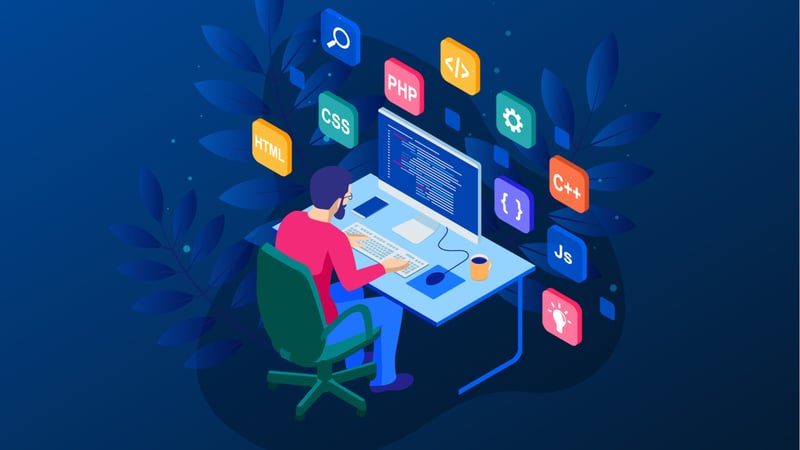This content originally appeared on DEV Community and was authored by Kevin Ly
Programming language is the foundation of software development, enabling us to communicate instructions to a computer in a structured and understandable manner. Just as there are many spoken languages around the world, there are numerous programming languages, each with its syntax and semantics suited for different purposes. We can joke that programming language is what turns the cool gadgets and machines we dreamed about in childhood fantasy movies into the reality we live in today. Before we discuss and talk about what programming language is and how many types there are, we talk about the history and background first, so that we can understand who created the first programming languages and what was their purpose back then.
History & Background:
The history of programming language began in 1843 with Ada Lovelace's pioneering algorithm for Charles Babbage's Analytical Engine, which is considered the first computer.
From 1949 to 1957, we saw the advent of Assembly Language and the creation of FORTRAN for scientific calculations.
The 1950s also introduced COBOL for business data processing and ALGOL language (which is the platform for many other programming languages such as C, C++, Java, and Pascal later on).
In the 1970s, C was developed for system software, while Pascal emerged for educational purposes.
The 1980s brought C++ with object-oriented features and Python for simplicity and readability.
The 1990s saw the rise of Java for platform independence and JavaScript for web development.
Since the 2000s, languages like Ruby, PHP, and Swift have been developed to meet various specific needs, reflecting programming languages' continuous evolution and specialization.
What is a programming language?
A programming language is like a special set of instructions that tells a computer what to do. It's what programmers use to write code, make software, and solve problems. Each programming language has its own rules for writing code, which we call the syntax, and how that code behaves
Types of programming language
Programming language can be broadly categorized into several types:
1. High-Level vs Low-level Languages:
High-level languages are designed to be easy for humans to read and write. These are languages we mostly see programmers code, and students learn in school like Java, Python, C++, JavaScript, etc.
Low-level languages are the languages closer to machine code and hardware, such as Assembly Language, offering more direct control over computer resources.
2. Functional vs Object-Oriented vs Procedural Languages:
Functional Languages: These focus on using math functions and data that don’t change. Think of them like a calculator where you get a result without changing the numbers. Examples include Haskell and Lisp.
Object-Oriented Languages: These organize code around "objects" and "classes," like how you might organize tools in a toolbox. This makes code easier to manage and reuse. Examples are C++, Java, and Python.
Procedural Languages: These focus on a sequence of instructions, like following a recipe step-by-step. Examples include C and Pascal.
3. Scripting Languages: Interpreted languages often used for automating tasks and web development, such as JavaScript, PHP, and Ruby.
What language should I choose if I'm new to programming?
The choice of programming language depends on factors such as the nature of the project, performance requirements, ease of learning, and community support. Beginners often start with high-level languages like Python due to its simplicity and versatility. But in my opinion, I would choose C++ when starting to learn code. C++ is a powerful language that provides a deep understanding of how computers work. It allows you to learn detailed concepts like memory management and low-level programming, which can give you a solid foundation for understanding more complex programming topics later on.
Conclusion:
Programming language is the lifeblood of our digital world, translating human ideas into executable instructions that computers understand. Just as spoken languages evolve and diversify, programming languages have a rich history shaped by pioneers like Ada Lovelace and developments spanning from Assembly to modern-day languages like Python and JavaScript.
Understanding this evolution not only unveils the origins of our digital landscape but also highlights the diverse roles each language plays. From the raw efficiency of low-level languages like Assembly to the user-friendly syntax of high-level languages such as Python, each serves distinct purposes in software development.
As technology advances, so too do programming languages, adapting to new challenges and opportunities. Whether you're drawn to the precision of C++ or the versatility of Python, choosing a programming language is like choosing a tool for a job—a decision influenced by project requirements, learning preferences, and community support.
Additional:
This blog post has been transformed into a video on our AlgoSync YouTube channel to reach a wider audience and share knowledge more broadly.
Link: Video's link
This content originally appeared on DEV Community and was authored by Kevin Ly
Kevin Ly | Sciencx (2025-02-09T22:57:09+00:00) Introduction to Programming Languages. Retrieved from https://www.scien.cx/2025/02/09/introduction-to-programming-languages/
Please log in to upload a file.
There are no updates yet.
Click the Upload button above to add an update.



